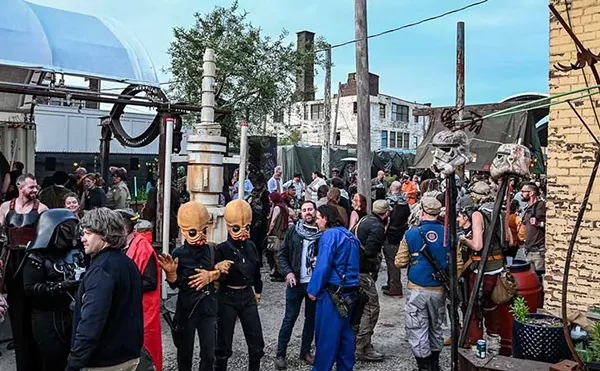
Audio By Carbonatix
[
{
"name": "GPT - Leaderboard - Inline - Content",
"component": "35519556",
"insertPoint": "5th",
"startingPoint": "3",
"requiredCountToDisplay": "3",
"maxInsertions": 100,
"adList": [
{
"adPreset": "LeaderboardInline"
}
]
}
]
Virginia Woolf's 1925 novel, Mrs. Dalloway, is a benchmark of high modernism, flush with overlapping streams of consciousness and an abiding faith in the ability of the well-chosen phrase to suggest some of our more elusive perceptions &emdash; it's a multilayered, word-drunk text and far from an obvious choice for film adaptation. And though the movie Mrs. Dalloway, directed by Marleen Gorris (Antonia's Line) and scripted by Eileen Atkins, is admirably steadfast in its attempt to translate Woolf's text to the visual medium, it succeeds only in part.
The film follows Clarissa Dalloway (Vanessa Redgrave) through a day in her life in June 1923. Fiftysomething and filled with a fluttering unease, she muses on her present life and past, particularly one summer some 30 years earlier when she met her future husband and rejected a more ardent, and much more interesting, suitor. Here the film works best, using flashbacks and Redgrave's voice-over to shuttle us between the world of the young Clarissa (Natascha McElhone) and her friends, poised on the brink of important decisions, and their fate as established members of the upper class, safe, secure and eternally discontented.
Running vaguely parallel to Mrs. Dalloway's story is another, seemingly unconnected one concerning a shell-shocked soldier (Rupert Graves), who wanders through the same June day with his young Italian wife (Amelia Bullmore). Though Graves gives an impressive performance, it's here that the film misfires. In the novel the two stories interact subtly but surely. The soldier's plight, the foundations of his reality shattered, is Mrs. Dalloway's late-in-life crisis writ large; it's also a paradigm of the modern chaos her quaint social conventions and obligations are meant to hold at bay. But in the film, his wrenching agony only serves to make her worries seem banal &emdash; and the final epiphany, when the trapped socialite sees the doomed soldier as a kindred spirit, remains obscure.
The movie is an interesting failure, intelligent and well-executed, with many small pleasures awaiting an attentive audience. But it's also, in the end, a reminder that not every novel is a potential film.
Richard C. Walls writes about the arts for the Metro Times. E-mail him at letters@metrotimes.com.





